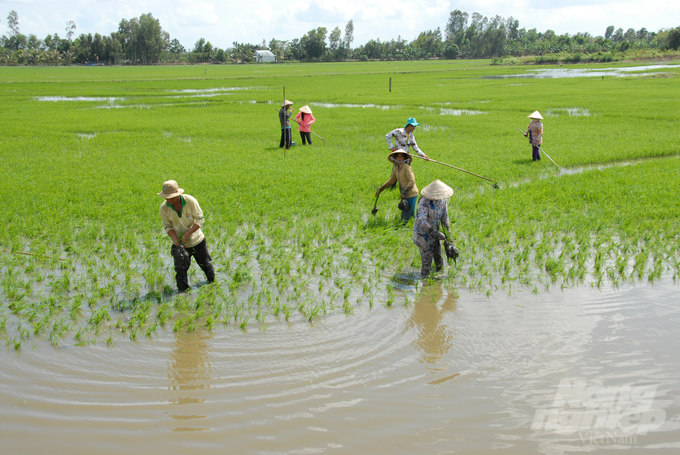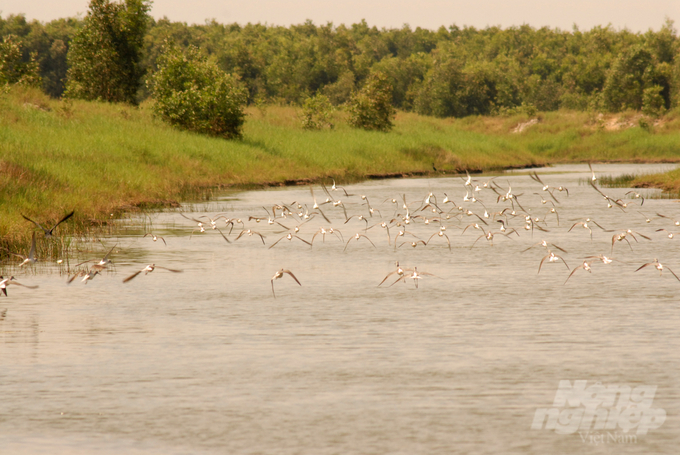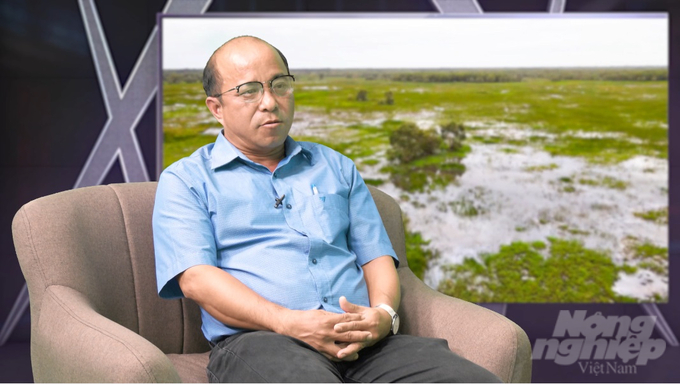May 22, 2025 | 14:57 GMT +7
May 22, 2025 | 14:57 GMT +7
Hotline: 0913.378.918
May 22, 2025 | 14:57 GMT +7
Hotline: 0913.378.918
Tram Chim National Park (Tam Nong district, Dong Thap province) is a wetland with an extremely diverse and rich ecosystem, playing an important role in the Mekong Delta. Therefore, the work of managing and preserving the National Park's ecosystem has received great attention and investment from Dong Thap province as experts and institutes at home and abroad.
However, in recent years, this work has encountered difficulties in management work. As a management and conservation unit in Tram Chim National Park, Mr. Doan Van Nhanh, Deputy Director of Tram Chim National Park Conservation Center, said that ecological management in Tram Chim is very difficult.

Around Tram Chim National Park, there are about 50,000 households, most of which are poor and lack arable land. Photo: Hoang Vu.
According to Deputy Director Doan Van Nhanh, in addition to scientific management, the National Park must manage humans (social management). Around Tram Chim National Park, there are about 50,000 households, most of which are poor and lack arable land. This partly affects their livelihoods, thereby impacting the park management.
"Besides, global climate change caused too hot years or years with a lot of rain. Meanwhile, it is known that the ecosystem is highly sensitive. A lot of rain will affect water regulation. Or if the sun is too hot, it will have influence on water regulation and fire prevention and fighting," added the Deputy Director of Tram Chim National Park Conservation Center.
Faced with the above difficulties and challenges, in order to make the management and conservation of the ecosystem in Tram Chim National Park more effective, there are the five most core contents that must be focused on.
As an environmental expert, Dr. Duong Van Ni, Chairman of the Mekong Conservancy Foundation, said: "First, we must manage the natural agents that shaped the area. Specifically in Tram Chim National Park, the natural agent that formed this area is the seasonal dry-flood regime, which means dry land in the dry season and flooded land in the rainy season. So, it is clear that we cannot change this function because this is one of the conditions for establishing an area with such a lot of biodiversity."

The natural agent that formed Tram Chim National Park is the seasonal dry-flood regime. Photo: Hoang Vu.
Second, it is necessary to manage the level of pollution, especially the level of surrounding agricultural and industrial activities that pollute and threaten the Park. Third, the level of exploitation needs to be managed, whether it is beyond the endurance level of that ecosystem or not.
The exploitation here is not only the material exploitation, such as catching birds, storks, etc., or gathering, but it can also be the noise caused by too many tourists and the use of many means of transport during the bird breeding season. Those noises or vehicles are the real threat to the endurance of the ecosystem.
Fourth, it is compulsory to manage the problem of diseases and invasive exotic species. Because if this problem cannot be managed, it will be difficult to maintain the original ecosystem. Finally, the ecosystem must be managed in harmony with global climate change.
For example, in the past, we rarely saw long periods of drought, but now the drought periods last longer, so we must know how to manage the hydrological regime so that it is suitable and does not exhaust the development of many biomes in the protected area.

Mr. Doan Van Nhanh, Deputy Director of Tram Chim National Park Conservation Center. Photo: VAN.
As Deputy Director of Tram Chim National Park Conservation Center Doan Van Nhanh shared, population and livelihood for people living in the buffer zone of Tram Chim National Park is one of the pressures on managing and preserving the Park's ecosystem. Thus, to reduce that pressure, in recent times, Tram Chim National Park as well as the local government in Tam Nong and Dong Thap province implemented some solutions as follows:
Firstly, every year Tram Chim National Park coordinates with branches to organize communication work to raise people's awareness about biodiversity conservation as well as natural resource protection, especially in the dry months.
Secondly, in recent years, Dong Thap province as well as branches have coordinated with the Park to organize plans for people to reasonably use resources with community participation. This partly improves people's livelihoods, especially during the flood season.
Next, the province as well as the local government have also had a number of budget sources to support households that specialize in illegally catching aquatic species in the Park and encourage them to switch to other more stable and sustainable occupations, avoiding illegal fishing that causes negative impacts on the ecosystem.
Besides, in recent times, projects and programs, especially WWF and UNDP projects, have greatly supported the livelihoods of people around Tram Chim National Park, especially during the flood season. For example, support people to store fish during the flood season so that they can exploit it after the flood season; support mushroom and vegetable growing models around the Park; and especially support a number of people in Tam Nong district to exploit vegetation to make raw materials such as Chinese onion. These activities contributed to improving the lives and livelihoods of people living in the buffer zone of Tram Chim National Park.
Translated by Thu Huyen
![Reducing emissions from rice fields: [2] Farmers’ commitment to the soil](https://t.ex-cdn.com/nongnghiepmoitruong.vn/608w/files/news/2025/05/05/dsc08881jpg-nongnghiep-140632.jpg)
(VAN) Clean rice cultivation model in Thuong Tan commune, Bac Tan Uyen district, is assisting local residents in achieving sustainable agriculture by substantially reducing costs, increasing productivity, and protecting the environment.

(VAN) At the conference to disseminate Resolution No. 68, AgriS introduced its digital agricultural ecosystem and reaffirmed its commitment to accompanying the Government in promoting private sector development and sustainable agriculture.

(VAN) 'Blue Ocean - Blue Foods' initiative is designed to restore marine ecosystems and establish sustainable livelihoods for local communities by cultivating a minimum of 1,000 hectares of cottonii seaweed in the first three years.
/2025/05/21/4642-3-112707_603.jpg)
(VAN) The V-SCOPE project has made direct contributions to three out of six pillars of the Comprehensive Strategic Partnership between Vietnam and Australia.

(VAN) Facing the threat of rabies spreading to the community, Gia Lai province urgently carries out measures to vaccinate dogs and cats on a large scale.

(VAN) Disease-free livestock farming not only protects livestock herds but also stabilizes production and livelihoods for many farmers in Tuyen Quang.

(VAN) Japan's grant aid project contributes to capacity building, promoting organic agricultural production, and fostering sustainable community development in Dong Thap province.